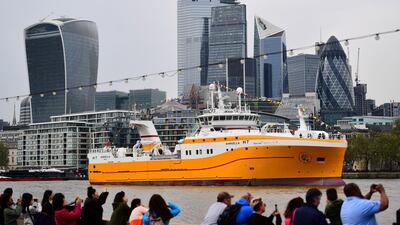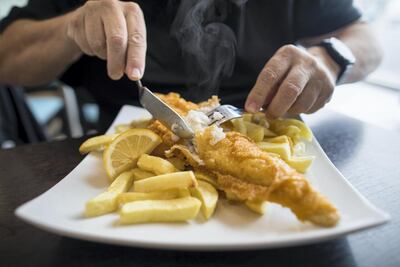A supertrawler that provides about 10 per cent of all fish sold in Britain’s chip shops has been unable to sail since Brexit after London failed to retain rights to the most bountiful deep seas.
The ship, which usually catches up to 2.3 million fish a week, previously operated under EU agreements but its permissions for 2021 had not been secured when the trade deal came into force.
The 81-metre Kirkella usually sails in sub-Arctic waters off Norway, Greenland and the Faroe Islands and catches between eight and 12 per cent of the UK's cod and haddock sold in fish and chip shops.
The government said it was still negotiating a permit for the Kirkella, which is based in Hull, in eastern England, and has a crew of about 100.
Hull East MP Karl Turner said the delay was the “last nail in the coffin” for the city’s fishing fleet and appealed to UK Prime Minister Boris Johnson to intervene.
"The Kirkella and its crew have no licences or quotas to fish anywhere and have no guidance as to when, if or to what extent that might change.
“It seems as if this government is hell-bent on putting the last nail in the coffin of distant-waters fishing, just at the time we are meant to be taking back control and giving a desperately needed boost to the fishing sector,” Mr Turner said.
British consumers prefer the cod caught in the North Sea near the Arctic to the mackerel and other species caught in their own waters. The mismatch has caused some of the most bitter moments of the negotiations since Britain voted to leave the EU in 2016.
James Withers, chief executive of Scotland Food & Drink, said Britain could lose its lucrative fish-processing industry as boats reroute from its landing points to countries still in the EU’s single market.
David Henig, director of the UK Trade Policy Project, said he was concerned for the Kirkella's prospects on the North Sea.
“UK-EU trade is being subject to what at least two of my eminent trade Twitter colleagues have called ‘shock therapy’,” Mr Henig tweeted.
UK Fisheries, which owns the trawler, said that without an agreement Britain would become more reliant on imports from Norway or Iceland.
“Previously, fishing opportunities with countries like Norway have been negotiated through the EU, but the UK now has to negotiate in its own right,” said UK Fisheries chief executive Jane Sandell.
“Because the Brexit deal took so long to get going, it means the negotiations hadn’t been done, so we’re now going into a fishing year without any fishing opportunities,” she said.
“The big concern is the crew – we want to get these guys to sea as soon as possible so they can be earning some money and have some certainty for 2021.”
A government representative said: “As an independent coastal state, the UK has put in place new arrangements to further influence the management of near and distant fish stocks to best serve the interests of the British fishing industry.
“Negotiations for fishing opportunities in 2021 will be concluded as soon as possible.”
Meanwhile, fishing businesses in Northern Ireland, which is part of the UK, claim the break with the EU has caused problems for their boats trying to land their catch.
Representatives are calling on the Dublin government to open up its EU harbours to Northern Ireland-registered boats after one catch was turned away after Britain’s transitional ties with the EU ended on December 31.
Alan McCulla of the fishing company SeaSource has asked for reciprocity on both sides of the border. Mr McCulla said seven Northern Ireland ports have been designated for landing catch from Irish boats, but only two at either end of the island for landing fish in the EU.



